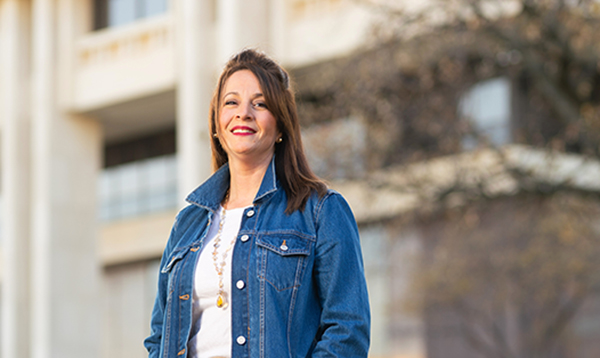Helping Them Grow
Dudley-Miller advocating for foster children, trauma survivors in her work

From The Ichabod - Winter 2021
Recent research on resiliency showed individuals who have healed from trauma share a common variable: They all have strong relationships and systems of support.
In her role as state director of the Kansas Court Appointed Special Advocates Association, Vanessa Dudley-Miller, msw ’06, sees the value of strong role models every day. The nonprofit organization works to pair children in foster care with volunteers who provide advocacy in the court system. Many of these children have experienced abuse or neglect, and having a positive relationship with an adult can have a long-lasting impact.
“There’s research showing that in the resiliency of these children a common factor is a strong relationship with an adult, and we believe that is provided through CASA,” Dudley-Miller said. “Even as they grow into an adult, having that positive role model as a child can possibly strengthen their coping skills, so whatever they experience as an adult they’ll be better equipped to handle. I see it as a lifelong benefit with CASA.”
Dudley-Miller began working at Kansas CASA this year, just before the COVID-19 pandemic hit. In her role, she provides support for the executive directors of CASA organizations across the state and recruits the program’s more than 900 volunteers. Those volunteers provide services to more than 2,000 children in foster care each year. While this sounds like a significant number, Dudley-Miller insists it’s only the tip of the iceberg, as the state of Kansas sees an average of 7,000 children come through the foster care or legal system each year because they have experienced some degree of abuse or neglect. Of those children, a significant percentage comes from minority populations.
“In Douglas County, they may have a population of African American children at 17 percent; however, when it comes to foster care, African American children account for 30 percent,” Dudley-Miller explained. “Making sure we’re capturing diversity on our boards and in our volunteers is important so we can provide for the needs of these children.”
In addition to her full-time job, Dudley-Miller is also a doctoral candidate in the therapeutic science program at the University of Kansas Medical Center School of Health Professions. She is currently working on her dissertation, which builds on her previous research regarding trauma and resilience. Among her goals is initiating what she calls a “paradigm shift” regarding how society looks at and talks about individuals who have experienced trauma, including children, adults and veterans.
“Based on what we know today versus what we knew 20 years ago, we are shifting the vocabulary we use with this population,” Dudley-Miller said. “We’re shifting from saying ’victim’ into saying ’survivor.’ It’s more person-centered. That’s something I’m starting to see happen in CASA at the national level. The trauma is something that is part of them, but it doesn’t define them.”
When it comes to identifying gaps in policies that could help Kansas CASA and other organizations better serve foster children, Dudley-Miller serves as a bridge between the “boots on the ground” and the legislators. She recently became more involved in this role when she was appointed to the Kansas Supreme Court Task Force on Permanency Planning, which advises the court on ways to provide for and improve the care of children who are under jurisdiction of the court. The group meets monthly and consists of judges, attorneys and other stakeholders who are involved in foster care services.
“It allows us to work together and be in the same place at the same time,” Dudley-Miller said. “We become so focused on our own agencies and organizations that it’s challenging, on a day-to-day basis, to stay on top of what’s developing, so this is a good way for us to communicate.”
Dudley-Miller isn’t the only Washburn University graduate in a CASA leadership role. Tabitha Keith, bsw ’18, recently took over as executive director of CASA of the High Plains in Hays, Kansas. While she was a student, Keith did her practicum at CASA, which she called “the perfect hands-on experience” to prepare her for her job. Dudley-Miller helps oversee Keith’s local organization.
“She seems like a powerful woman,” Keith said of Dudley-Miller. “If she has her mind set on something, she’s going to finish it. She always does her job very well.”
The important work Dudley-Miller is doing now was also bolstered by her experiences at Washburn, where she felt the social work program was an ideal fit for her. She also believes her clinical experiences as a student set her up for career success.
“After graduating from Washburn, I started my first job, and for the most part I was fairly confident and able to do my job straight out of school,” Dudley-Miller said. “I was provided with all the tools. When I was at Washburn, the professors were amazing. To this day I still have contact with some of them. These have been lifelong relationships that we developed.”